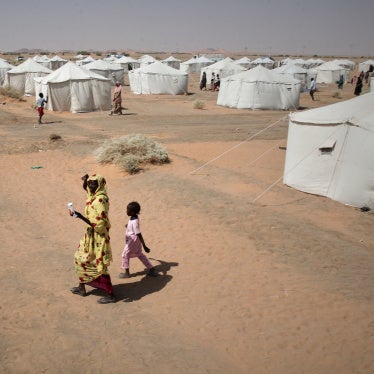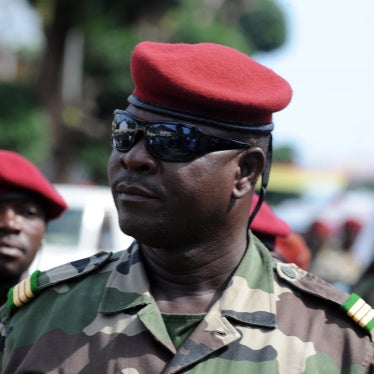UPDATE: On October 31, the court convicted Issa Sallet Adoum, Ousman Yaouba, and Tahir Mahamat of the 3R rebel group for war crimes and crimes against humanity in May 2019 in the villages of Koundjili and Lemouna, northwest Central African Republic. “Today’s conviction sends a strong signal that those who commit the worst crimes in the Central African Republic can be held to account, even after so many years of widespread impunity,” said Elise Keppler, associate international justice director at Human Rights Watch. The verdict is a milestone for the victims, including those who bravely testified, some traveling to the country’s capital for the first time in their lives to do so, and communities that have been terrorized during the country’s conflicts.”
(Nairobi) – The Special Criminal Court in the Central African Republic will issue its first verdict on October 31, 2022, an important step in justice efforts addressing atrocities committed in the country, Human Rights Watch said today.
Issa Sallet Adoum, Ousman Yaouba, and Tahir Mahamat, alleged members of the “3R” rebel group, stood trial on charges of war crimes and crimes against humanity, accused of being responsible for atrocities committed in May 2019 in the villages of Koundjili and Lemouna, northwest Central African Republic.
“The people in the Central African Republic have long experienced brutal, widespread atrocities with impunity,” said Elise Keppler, associate international justice director at Human Rights Watch. "The Special Criminal Court’s upcoming verdict in its first trial spotlights the importance of investing in justice efforts for victims of the crimes.”
Human Rights Watch documented the attacks by the 3R rebel group on civilians in the villages of Koundjili and Lemouna, and the town of Bohong in July 2019. During the attacks people were tied up and executed. About 46 civilians were killed and the communities were pillaged. The attack came three months after the 3R group and 13 other armed groups signed a peace accord.
The Special Criminal Court (SCC), which became operational in 2018, is a novel court, staffed by both international and national judges and prosecutors. It benefits from extensive assistance by the United Nations and international donors, including the United States and the European Union. The court is based in the country’s capital, Bangui, and has authority to try grave crimes committed during successive armed conflicts in the Central African Republic since 2003.
The court’s first trial began on April 19, 2022, though it immediately went on a one week recess when defense lawyers did not appear due to concerns around their fees. The lawyers returned to court on April 25 and requested further time to prepare for trial while discussions of fees continued.
The trial resumed on May 16 and continued through June, during which time the judges heard testimony from about three dozen witnesses. Most witnesses testified in person but in some cases where a witness was unable to travel to the court, their testimony was presented in writing, with the defendants given an opportunity to respond to it.
Approximately a half dozen witnesses testified in closed session given the sensitivity of their testimony related to sexual violence. Some victims joined the case as civil parties and were represented by lawyers, and some of these civil parties were also witnesses. After a recess, closing arguments took place in August.
During the trial, lawyers representing the victims highlighted concerns for the security of those who testified in open court. Security remains an ongoing concern given that much of the Central African Republic is under the control of armed groups.
Trial sessions were broadcasted on the radio in French and local languages. In person outreach activities did not occur with the communities most affected by the crimes, due in part to a fuel crisis and difficulties related to overall insecurity in the country.
Staffing and resources remain a challenge for the court, magnified by its insecure funding and complex partnership with the UN. A psychologist on contract to support witnesses was unavailable during at least much of the trial. No legal adviser was available to support the judges, especially to conduct research, although an adviser is being recruited, court staff have said. A new fee structure for lawyers was issued on June 14, following discussions between court staff, donors, and lawyers, which provided for an increase in fees and resources for transport and administrative needs.
In a positive development, three other people suspected of offenses have been arrested in the last month. Firmin Junior Danboy and Vianney Semndiro, who have been army officers, are facing charges of alleged crimes against humanity committed in a military detention center in Bossembélé between 2009 and 2013. And a former Seleka general Abdel Kader Khalil is facing charges of war crimes and crimes against humanity.
All efforts should be made to ensure that all fugitives are in the dock, Human Rights Watch said. This follows the surprise release of a sitting minister, Hassan Bouba, by local police in November 2021 after his SCC arrest. Bouba remains at liberty.
The court has yet to announce when a second trial will start, though more than a dozen cases are under judicial investigation, according to court staff. Judicial investigation is the stage that precedes trial, evidence permitting.
The court is also conducting investigations in tandem with the International Criminal Court (ICC), which currently has four suspects in custody on charges of crimes committed in the Central African Republic, three of whom are on trial. The ICC can play an important role in pursuing cases involving more senior leadership, while the Special Court seeks to conduct trials in a wider set of cases in country, alongside cases by the ordinary courts. The Special Criminal Court and ICC can cooperate and support each other to advance the delivery of justice, Human Rights Watch said.
“The Special Criminal Court is a novel effort to deliver much lauded, but rarely delivered, accountability for atrocities in the national courts in the country where the crimes were committed,” Keppler said. “The court’s ability to prosecute cases, protect witnesses, arrest suspects, and work in coordination with the ICC should be closely watched and strongly supported to promote justice for victims in the Central African Republic and elsewhere where such courts may be useful.”









